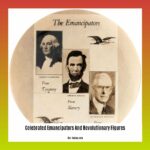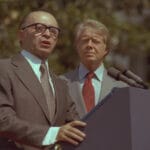Charles Remond Douglass, born October 21, 1844, in Lynn, Massachusetts, lived a life interwoven with the tumultuous tapestry of 19th-century America. While inevitably linked to the legacy of his renowned father, abolitionist icon Frederick Douglass, Charles carved his own distinct path, marked by military service, public service, and a steadfast commitment to equality. This article delves into the remarkable yet often overlooked story of Charles Remond Douglass, a man who navigated the complexities of his time, leaving an indelible mark on American history.
Early Life and Family: Growing Up Douglass
Charles’s upbringing was far from ordinary. As the youngest son of Frederick Douglass and Anna Murray Douglass, he was raised in the heart of the abolitionist movement. Imagine a childhood steeped in activism, with lively discussions about freedom and equality echoing through the family home in Rochester, New York. Named after the prominent abolitionist Charles Lenox Remond, a close family friend, young Charles was exposed to the fight for human rights from a tender age, likely absorbing the powerful rhetoric and urgent calls for justice. He even helped distribute copies of his father’s influential newspaper, The North Star, immersing himself in the world of social reform and perhaps foreshadowing his own future contributions to society.
A Soldier’s Courage: Answering the Call to Arms
When the Civil War erupted, Charles, likely inspired by his father’s fervent advocacy, answered the call to duty. At just 17, he became one of the first African Americans to enlist in the military in New York, joining the ranks of the celebrated 54th Massachusetts Infantry, a regiment composed entirely of Black soldiers. This act of bravery speaks volumes about his character and unwavering commitment to the cause of freedom, particularly given the pervasive racial prejudice of the era. Later, he served with the 5th Massachusetts Cavalry, rising to the rank of First Sergeant. While a lung condition unfortunately led to his discharge in 1864, preventing him from seeing combat, his willingness to serve underscores his dedication to a more just and equitable nation. His military records, which warrant further investigation, likely hold more details about the nature of his illness and the circumstances surrounding his discharge.
Beyond the Battlefield: A Multifaceted Career
Following the war, Charles embarked on a diverse and impactful career path. He followed in his father’s footsteps, pursuing journalism, then transitioned into government service as a clerk for the Freedmen’s Bureau in Washington, D.C. This role likely provided him with firsthand experience of the challenges faced by newly emancipated African Americans, further solidifying his commitment to social justice. He later delved into real estate and served as secretary and treasurer for the District of Columbia’s school district, demonstrating his versatility and commitment to public service. These varied experiences suggest a restless intellect, a man driven by a desire to contribute meaningfully to society. Further research into his journalistic work could reveal his perspectives on the pressing issues of his day, while exploring his role in the D.C. school district could illuminate his contributions to education in the post-war era.
A Tapestry of Love and Loss: Family Life
Charles’s personal life was a blend of joy and profound sorrow. His first marriage, to Mary Elizabeth Murphy in 1866, resulted in six children. Tragically, only one, Joseph Henry, a gifted violinist, survived to adulthood. The loss of five children must have been an unimaginable burden to bear, a testament to the harsh realities of the time. Following Mary Elizabeth’s death in 1879, Charles found love again with Laura Haley. Their son, Haley George Douglass, continued the family’s legacy of public service, becoming a respected educator at Dunbar High School in Washington, D.C., and later serving as mayor of Highland Beach, Maryland, from 1922 to 1954. These family stories, woven with threads of both triumph and loss, provide a glimpse into the human side of Charles Remond Douglass, reminding us that historical figures were also individuals who experienced the full spectrum of human emotions.
A Legacy Forged in Service: A Man in His Own Right
Charles Remond Douglass passed away on November 23, 1920, leaving behind a legacy that extended far beyond his famous lineage. He was a soldier, a civil servant, an advocate for equality, and a devoted family man. While he may not have achieved the same level of renown as his father, his contributions to American society were significant. He was a pioneer, one of the first African Americans to enlist in the Union Army, and a dedicated public servant who worked tirelessly to improve the lives of others. His story, though often overshadowed by his father’s prominence, deserves to be remembered and celebrated. Further research into the specifics of his work within the Freedmen’s Bureau, his journalistic endeavors, and his contributions to education could reveal even more about his impact on a nation grappling with the aftermath of slavery and the challenges of Reconstruction. Charles Remond Douglass stands as a testament to the enduring human spirit, a reminder that even in the shadow of greatness, individuals can carve their own unique paths and leave the world a little better than they found it.
Delve into the historical enigma of Absalom’s monument and the compelling story of Soviet dissident Anatoly Sharansky, a man who challenged an empire for his freedom.
- Red Cloud, NE: Discover Willa Cather’s Legacy - April 11, 2025
- Remember Old Social Media Sites? Their Rise and Fall - April 11, 2025
- How many days till Feb 3?Accurate Countdowns & Tools - April 11, 2025















